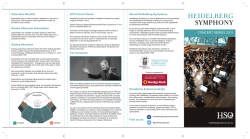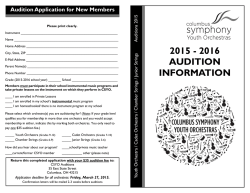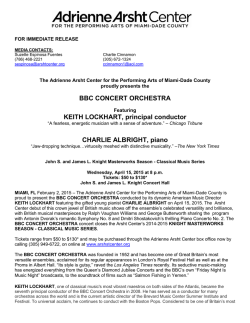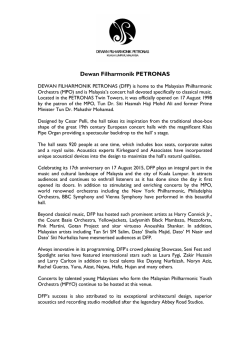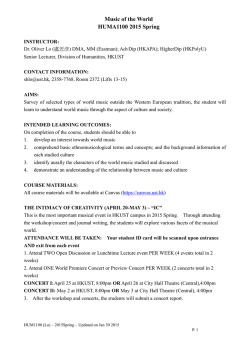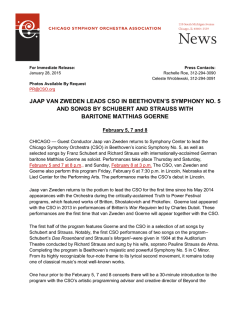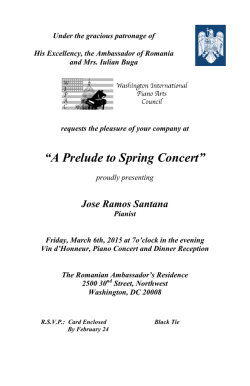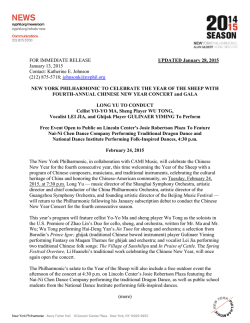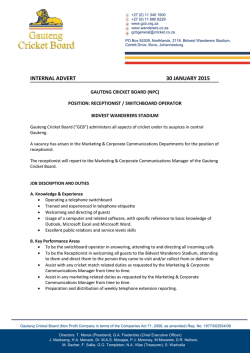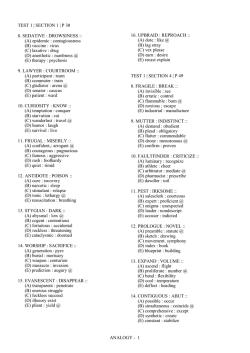
2015 conference timetable download
2015 CONFERENCE SCHEDULE WEDNESDAY 28 JANUARY 12:30 REGISTRATION OPENS – SAGE GATESHEAD CONCOURSE 14:00 OPENING SESSION HALL 2 Welcome to delegates from Kathryn McDowell, Chair of the ABO, Anthony Sargent, General Director, Sage Gateshead and Sam Jackson, Managing Editor, Classic FM OFFICIAL OPENING by Ed Vaizey MP, Minister of State for Culture and the Digital Economy Keynote Speaker: Helen Boaden, Director of Radio, BBC 15:30 NETWORKING BREAK – Sponsored by British Association of Concert Halls HALL 2 BALCONY 16:00- Video message from David Miliband, President and CEO, International Rescue Committee 17:30 followed by PEOPLE POWER: LEADERSHIP AND CHANGE HALL 2 As British orchestras face perhaps the greatest challenge to their resilience in their history, it's time to have a close look at the role of leadership in effecting change. Are we giving our current leaders the space and skills to manage change, and nurturing the next generation of leaders? How have other industries and third sector organisations coped with the challenges of leadership? And how are our international colleagues coping with similar pressures on funding and the need to change? David Baile, Chief Executive, ISPA Paul Callaghan CBE, Chairman, The Leighton Group Sue Hoyle, Director, Clore Leadership Foundation Matthias Naske, Intendant, Wiener Konzerthaus Anthony Sargent, General Director, Sage Gateshead 18:45 COACHES FROM HOTEL TO DISCOVERY MUSEUM 1 19:00 RECEPTION – Sponsored by Tessitura Networks NEWCASTLE DISCOVERY MUSEUM 20:00 CONFERENCE DINNER Discovery Museum Followed by presentation of the 2014 ABO Award and ABO/Rhinegold Awards by Sara Mohr-Pietsch, presenter, BBC Radio 3 23:30 COACHES TO HOTEL THURSDAY 29 JANUARY 08:30 REGISTRATION OPENS SAGE GATESHEAD CONCOURSE 09:30 LEARNING FROM SPORT: BUILDING THE AUDIENCE HALL 2 The North East is a powerhouse for sport, so what better opportunity to hear how sports clubs approach some of the same issues we face. In our first session on learning from sport we look at how two contrasting clubs have tackled the challenge of building an audience in a competitive world for people's entertainment choices, in the case of cricket from the position of a 'sunset industry' taking steps to revive and broaden its audience through new formats, or in the case of basketball building a new audience in a new location. Paul Blake, Managing Director, Newcastle Eagles Geoff Cook, Director of Cricket, Durham County Cricket Club David Harker, Chief Executive, Durham County Cricket Club Harry Pearson, Writer and Journalist Leonora Thomson, Director of Audiences and Development, Barbican Centre LEADERSHIP AND CHANGE: SUCCESSION PLANNING MEC C9 Following our opening session we take an in-depth look at how well our sector deals with succession planning. What skillset are boards looking for when recruiting chief executives? Are they looking for a safe pair of hands, or prepared to take a risk? Are we nurturing the next generation, and providing our senior managers with the skills and overview of the business they need to reach the top? And what role should funding agencies play in developing the leaders of tomorrow? Nicky Oppenheimer, Odgers Berndtson John Summers, Chief Executive, The Hallé Jane Tarr, Director, Organisational Resilience, Environmental Sustainability and North, Arts Council England 2 PEOPLE POWER: THE SISTEMA EXPERIENCE NORTHERN ROCK FOUNDATION HALL Sistema Scotland established its Big Noise orchestra in the summer of 2008 in Raploch, Stirling. Later that year, In Harmony was founded in England with projects beginning in 2009. Funded as action research projects, what is the learning for the wider orchestral sector? What can be adapted and used by orchestras in their creative music-making and participatory programmes? How are the musicians' experiences of working in severely deprived communities changing their practice? What is the future for youth orchestral playing in the long term? Francis Cummings, Director of Music, Big Noise Ed Milner, Head of Music Learning, Sage Gateshead Sara Mohr-Pietsch, Presenter, BBC Radio 3 Beth Ponte, Executive Director, Institute of Social Action through Music Gavin Reid, Director, BBC Scottish Symphony Orchestra 11:00 NETWORKING BREAK HALL 2 BALCONY 11:30 LEARNING FROM SPORT: DEVELOPING THE TALENT HALL 2 In our second session on learning from sport, we look at the parallels between our members' work in music education, and at how and why leading cricket and football clubs engage with their community and nurture talent. Deborah Annetts, Chief Executive, ISM Suzanne Hay, Head of Partnerships and Learning, BBC National Orchestra of Wales Ken Teears, Development Director, Sunderland AFC Foundation John Windows, Academy Manager, Durham County Cricket Club LEADERSHIP AND CHANGE: FUTURE OF WORK MEC C9 Launched by Professor Lynda Gratton and the Hot Spots Movement in 2009, Future of Work provides a platform for recognising key trends and identifying ways in which businesses can remain dynamic, innovative and competitive. Its members, which include high-profile organisations such as Shell, the Coca-Cola Company and Tata Consultancy Services, come together to forecast what work will look like in the future and how corporations should adapt their work practices to attract and engage with the best global talent. What will the workplace of the future look like, and what changes do we need to make to build resilience and purpose into our organisation and our people? Emma Birchall, Head of Research, Future of Work Anna Rowe, Consultant PEOPLE POWER: TOURING TO CHINA NORTHERN ROCK FOUNDATION HALL 3 Following our previous British Council sessions on touring to Brazil and India, we turn our attention to the challenges and opportunities of touring to China, with a special focus on how we can tap into the interest in British orchestras in China’s second and third tier cities. Cathy Graham, Director of Music, British Council Vicky Shilling, Senior Manager, Tours & Projects, Intermusica Elizabeth Woollacott, Director, Music Live 13:00 LUNCH BARBOUR ROOM 14:00 LEADERSHIP AND CHANGE: TESTING THE MODEL NORTHERN ROCK FOUNDATION HALL We keep talking about change, but how do we change a business model which suffers so acutely from endemic 'cost disease'? How are our colleagues in Higher Education and the museums sector coping with the challenge of leadership and the need for change, at a time of rapidly contracting public investment? Dr Eric Cross, Dean of Cultural Affairs & Director, Newcastle Institute for Creative Arts Practice Dr Christopher Lake, Director, Syllogism Iain Watson, Director, Tyne & Wear Archives & Museums Godfrey Worsdale, Director, Baltic PEOPLE POWER: CREATIVE SKILLS MEC C9 Our sector can occasionally be guilty of not looking outside its bubble at the opportunities that already exist for training and diversifying our workforce. From the National Skills Academy to opportunities for paid apprenticeships and interns, Creative & Cultural Skills will give us an overview of how they can help. Sara Whybrew, Director Creative Employment Programme, Creative & Cultural Skills PEOPLE POWER: THE NEXT GENERATION HALL 2 The BBC’s 'Ten Pieces' project aims to open up the world of classical music to children and inspire them to develop their own creative responses to the pieces through music, dance or digital art. 'First Time Live - Youth' is an innovative touring programme to enable better access to high quality work for young people of secondary age, many of whom are not engaged in the arts and who live in culturally underserved areas. What impact can national and regional strategic initiatives have on local areas, schools and in particular the young people at whom they are aimed? What is the role for orchestras? Stuart Bruce, Partnership Manager, Orchestras Live Katy Jones, Executive Producer, Ten Pieces, BBC Music Sara Mohr-Pietsch, Presenter, BBC Radio 3 4 Ellara Wakely, Senior Learning Manager, BBC Proms and London Performing Groups 15:30 NETWORKING BREAK – Sponsored by Sinfini Music HALL 2 BALCONY 16:00 PEOPLE POWER: ARE THE PUNTERS IN CHARGE? In association with the Royal Philharmonic Society HALL 2 At no other time has there been more cultural choice for the consumer. Yet, how far should audiences dictate the cultural agenda and how do we manage this power balance? When, for many, classical music is not a top priority, how do we attract new ticket buyers and what can we do to encourage existing supporters to engage more? Svend Brown, Director, Glasgow UNESCO City of Music Ruth Mackenzie CBE, Interim CEO and Creative Director, The Space Abigail Pogson, Chief Executive, Spitalfields Music Jo Taylor, Senior Consultant, Morris Hargreaves McIntyre Claire Whitaker, Director, Serious PEOPLE POWER: THE MUSIC BUSINESS MEC C9 Following our look at Creative & Cultural Skills, we turn to our colleagues in UK Music to find out more about the opportunities they can bring to orchestras and conservatoires to engage with their training offer in music business skills. What can classical music learn from rock & pop, and how we can get more enterprising at a time of declining public subsidy? Lorna Finlayson, Head of Skills and Training, UK Music Helen Gammons, Programme Director, MBA for Music & Creative Industries, Henley Business School Cathy Koester, Music Academic Partnership Research Envoy, UK Music Claire Mera-Nelson, Director of Music, Trinity Laban Conservatoire of Music and Dance PEOPLE POWER: THE INCLUSIVE ORCHESTRA NORTHERN ROCK FOUNDATION HALL Technology has enabled the invention of new instruments and assisted technology to facilitate the participation of musicians with disabilities. How are orchestras changing their practice to be more inclusive and what are the possibilities for composers creating music for these new instruments and soundscapes? Clarence Adoo MBE, Orchestra Animateur, Sage Gateshead Prof. Helena Gaunt, Vice Principal and Director of Academic Affairs, Guildhall School of Music and Drama Ian Ritchie, Artistic Director, Setúbal Music Festival and Youth Ensemble Thursa Sanderson, Chief Executive, Drake Music Scotland 18:30 CIVIC RECEPTION 5 19:30 CONCERT – Royal Northern Sinfonia HALL 1 21.30 POST-CONCERT RECEPTION in association with BBC Radio 3 and Royal Northern Sinfonia, including an address from Alan Davey, Controller, BBC Radio 3 NORTHERN ROCK ROUNDATION HALL FRIDAY 30 JANUARY 09:00 REGISTRATION OPENS SAGE GATESHEAD CONCOURSE 09:30 CLASSIC FM DEBATE: DO ALL ORCHESTRAS SOUND THE SAME? HALL 2 As orchestral music finds a new audience in emerging markets, with new concert halls and orchestras appearing at rapid pace, and as British orchestras operate in an increasingly global marketplace for musicians, are we in danger of homogenising our soundworld? Do British orchestras actually sound British anymore? Anne-Marie Minhall, Presenter, Classic FM Richard Morrison, Chief Music Critic, The Times Costa Pilavachi, Senior Vice-President, Classical A+R, Universal Music Group International John Summers, Chief Executive, The Hallé LEADERSHIP AND CHANGE: THE NORTH EAST EXPERIENCE MEC C9 How are our colleagues in the North East adapting to the challenge of reduced public investment and competition for people’s entertainment spend? Are there lessons we can learn from their positive examples of collaboration and enterprise? Jim Beirne, Chief Executive, Live Theatre Mark Dobson, Chief Executive, Tyneside Cinema Dominic Parker, Director of Communications & Development, Sage Gateshead PEOPLE POWER: NEW MUSIC AND THE CHAMBER ORCHESTRA NORTHERN ROCK FOUNDATION HALL Chamber orchestras are not alone in finding programming contemporary repertoire a box office challenge when it comes to conservative audiences, but that challenge can be even greater at venues without a regular concert series. What role should orchestras, promoters and our colleagues in Orchestras Live play in supporting composers and sharing the risk? Kevin Appleby, Concert Hall Manager, Turner Sims Concert Hall Gabriel van Aalst, Chief Executive, Academy of St Martin in the Fields 6 Jan Ford, Partnerships Manager, Orchestras Live James Morgan, Composer and Conductor 11:00 NETWORKING BREAK HALL 2 BALCONY 11:30 CLASSIC FM DEBATE: GAME ON! HALL 2 Video games are becoming an increasingly lucrative marketplace for orchestras, whether it be putting on concerts of games music or being booked to record the soundtrack. How can we maximise these opportunities, and what does the games industry need from us to make sure we beat off the competition? James Hannigan, Composer Sam Jackson, Managing Editor, Classic FM James Williams, Director, Residencies and Regional Programme, Philharmonia Orchestra PEOPLE POWER: NURTURING THE COMPOSER MEC C9 The second (or third) performance conundrum is nothing new, and previous schemes do not appear to have made a significant difference to orchestral programming. What are the barriers to getting repeat performances of new repertoire? Are we trapped in an obsession with premieres? How can we tap into the wealth of existing scores, many of which our members have commissioned, and crucially, how can we help composers earn a living? Tansy Davies, Composer Richard Hawley, Head of Artistic Programming, THSH Birmingham Sarah Osborn, Chief Executive, Music Publishers Association Vanessa Reed, Executive Director, PRS for Music Foundation Dougie Scarfe, Chief Executive, Bournemouth Symphony Orchestra PEOPLE POWER: MUSICIANS AS LEADERS NORTHERN ROCK FOUNDATION HALL What is the perspective of the orchestral musician when it comes to learning and participation work, especially those who lead projects? Given that the funding climate is changing, how might we use this work to make the best possible case for investment, both private and public? Can this work inform the artform itself, for example how musicians perform on the platform, and what role should Learning departments play in generating new audiences? Cath Arlidge, Co-Principal Second Violin, City of Birmingham Symphony Orchestra Bill Chandler, Associate Leader, Royal Scottish National Orchestra Tom Redmond, Horn Player, The Hallé Sarah Willis, Horn Player, Berlin Philharmonic (by video link) 13:00 LUNCH BARBOUR ROOM 7 14:00 - CLASSIC FM DEBATE: DOES CLASSICAL MUSIC NEED A RE-BOOT? 15:00 HALL 2 Following Max Hole’s provocative speech at the ABO Conference in 2013, the clamour for a re-invention of the classical concert experience is getting ever louder. Is it really true that “people are bored of being bored in concert halls”? If classical music doesn’t reinvent itself for the digital age, will it genuinely wither and die? Stephen Maddock, Chief Executive, City of Birmingham Symphony Orchestra Tom Morris, Artistic Director, Bristol Old Vic John Suchet, Presenter, Classic FM PEOPLE POWER: THE MISSING RUNGS MEC C9 One of the most fondly remembered programmes from the ABO's past was The Missing Rungs, which provided training and mentoring opportunities for aspiring leaders. Offering a confidential space for delegates to talk about their career aspirations and training needs, this session will help the ABO work out what steps it may need to take to help develop the next generation of leaders. Richard Wigley, Wigley Arts Peter Helps, Chief Executive, sinfonia ViVA PEOPLE POWER: WHAT THE POLLS SAY NORTHERN ROCK FOUNDATION HALL As the General Election approaches, what are the polls predicting, what flavour of government might we end up with, and what will this mean for funding for the arts across the nations? Rosie Luff, Account Director, Hanover Keith Motson, Membership & Communications Manager, ABO 15:15 15:45 HALL 2 CLOSING SPEAKER: Sir Peter Bazalgette, Chair, Arts Council England CLOSING SESSION HALL 2 The closing session reports on the conference and draws the threads together. Mark Pemberton, Director of the ABO, will outline the legacy of the conference and the issues raised that the ABO will take forward, Luiz Coradazzi of British Council Brazil will give an update on the Transform Orchestras Leadership Programme, and we look ahead to the 2016 conference in Birmingham, hosted by the CBSO. 8
© Copyright 2026
